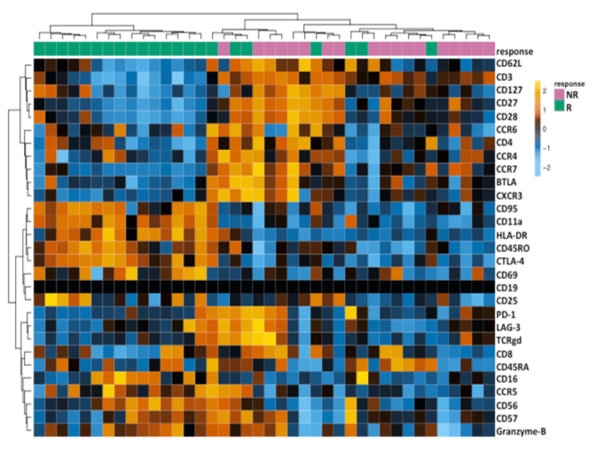What we investigate
Our laboratory is interested in applying the latest molecular, cellular, and functional measurement technologies for understanding the mechanisms of melanoma progression and identifying novel biomarkers and drug targets.
KEYWORDS
biomarkers, melanoma, precision medicine, translational oncology

Our research in more detail
New technologies such as single-cell sequencing, proteomics, and multi-dimensional imaging have allowed for unprecedented insights about the tumor microenvironment. Applied to material collected from well-curated patient cohorts receiving the latest precision medicines, these tools enable the identification of 1) mechanisms of failed response to immuno- or targeted- therapies, 2) biomarkers of therapeutic response, and 3) novel targets for immuno-modulation or targeted therapy. These translational research goals are now achievable through the direct use of material from consenting patients, and with the comprehensive melanoma biobank of the University of Zurich Hospital. Well-characterized cells from these tumors have been systematically profiled (i.e. DNA, RNA, proteome) and used for high-throughput small-molecule screening to identify novel targets in untreatable melanomas. Not only do these drugs have potential for clinical application, but they also reveal basic mechanisms of melanoma biology that well help us build better models for tumor initiation and progression.
Selected publications
SKINTEGRITY.CH Principal Investigators are in bold:
- Basler L, Gabrys HS, Hogan SA, Pavic M, Bogowicz M, Diem V, Tandini-Lang S, Forster R, Kudura K, Huellner MW, Dummer R, Guckenberger M and Levesque MP. (2020). Radiomics, Tumor Volume, and Blood Biomarkers for Early Prediction of Pseudoprogression in Patients with Metastatic Melanoma Treated with Immune Checkpoint Inhibition. Clin Cancer Res 26, 4414—4425.
- Paulitschke V, Eichhoff O, Gerner C, Paulitschke P, Bileck A, Mohr T, Cheng P, Leitner A, Guenova E, Saulite L, Freiberger S, Irmisch A, Knapp B, Zila N, Chatziisaak TP, Stephan J, Mangana J, Kunstfeld R, Pehamberger H, Aebersold R, Dummer and Levesque MP. (2019). Proteomics identifies a marker signature of MAPKi resistance in melanoma. EMBO J 38, e95874.
- Hogan S, Courtier A, Cheng P, Jaberg-Bentele N, Goldinger S, Manuel M, Perez S, Plantier N, Mouret JF, Nguyen-Kim TD, Raaijmakers MIG, Kvistborg P, Pasqual N, Haanen J, Dummer R and Levesque, MP. (2019) Peripheral Blood TCR repertoire profiling may facilitate patient stratification for immunotherapy against Melanoma. Cancer Immunol Res 7, 77-85.
- Krieg C, Nowicka M, Guglietta S, Schindler S, Hartmann FJ, Weber LM, Dummer R, Robinson MD, Levesque MP* and Becher B*. (2018) High-dimensional single-cell analysis predicts response to anti-PD-1 immunotherapy. Nat Med 24, 144-153. *shared senior authors
- Cheng PF, Shakhova O, Widmer DS, Zing D, Benedetta B, Raaijmakers MMI, Eichhoff OM, Goldinger SM, Hemmi S, Hoek KS, Sommer L, Dummer R, and Levesque MP (2015). Methylation dependent SOX9 expression mediates invasion in human melanoma cells and is a negative prognostic factor in advanced melanoma. Genome Biol 16: 42.
